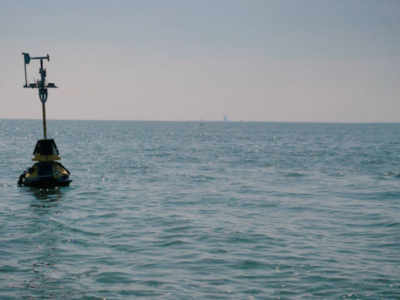
Keep up with energy-related developments in the Great Lakes area with Great Lakes Now’s biweekly headline roundup.
Click on the headline to read the full story:
Illinois:
The lawsuit filed against Marathon Pipe Line in Madison County Court alleges multiple violations of the Illinois Environmental Protection Act.
Indiana:
The funding was made available through Duke Energy’s Partnership Program. Funds can be used for things like tours and special events to promote a community or region’s business sites, marketing campaigns, promotional materials, and website development. Duke awarded $120,000 dollars to 26 organizations.
Michigan:
- Michigan eligible for $183 million to make low-income homes more energy efficient – The Detroit News
The money is part of $3.1 billion for weatherization approved as part of the bipartisan infrastructure law last year. It can be used to retrofit homes to update heating and cooling systems, improve electrical appliances, install insulation and more.
Two manufacturing plants in Michigan are among those in western Great Lakes states recently recognized by federal environmental regulators for energy efficiencies.
The U.S. Environmental Protection Agency said 93 plants nationwide last year earned its ENERGY STAR industrial designation, including two dozen in western Great Lakes states.
- Lights out: Profitable Michigan utility shut off electricity to homes hundreds of thousands of times – Energy News Network
Three months into the pandemic, Michigan’s largest power company, DTE Energy, began ramping up power shut-offs for customers behind on their bills. A regulatory system built to prioritize investors, not affordability, let it happen.
Dueling court filings in recent days pit certain business interests against others in the legal fight between Michigan’s governor and Enbridge over the Canadian company’s Line 5 pipeline.
Amicus briefs filed a few days apart last week in federal court by the Great Lakes Business Network and a group of six large chambers of commerce argue opposing sides of the battle between Gov. Gretchen Whitmer and the energy transportation company. The governor wants Enbridge’s countersuit tossed out of federal court after she dropped her case to halt the flow of Line 5.
- Marquette University bars direct fossil fuel investments with its $929 million endowment – National Catholic Reporter
Marquette announced an update March 24 to its university investment policy that bars investments in public securities whose primary business involves the exploration and extraction of coal, oil and gas. The move was approved by its board of trustees.
- Utilities on the hunt for thousands of acres for solar development – Crain’s Detroit
DTE Energy Co. is in the market for 20,000 to 35,000 acres of southern-facing flat land in Michigan to erect solar arrays over the next 10 to 15 years.
Consumers Energy Co., which generates 40 megawatts of electricity from solar today, has plans to be at 8,000 megawatts of energy from the sun by 2040, requiring anywhere between 40,000 and 56,000 acres of land for solar arrays.
Minnesota:
- Minnesota cities want permission to move faster than state on energy codes – Energy News Network
Minnesota’s approach to updating state building energy codes is too slow given the urgency of the climate crisis, according to a coalition of cities and clean energy advocates that is pressing for swifter change.
Some of the state’s largest cities and suburbs are seeking permission from the Legislature to adopt model national energy codes for larger commercial buildings at a faster pace than the six-year cycle used by state officials.
- DNR releases details of two more Line 3 aquifer breaches – Minnesota Public Radio
The Minnesota Department of Natural Resources has released details of more groundwater leaks caused by the construction of the Line 3 oil pipeline last year.
The DNR has completed its investigation of three sites where crews installing the pipeline breached underground aquifers, causing uncontrolled — and unauthorized — flows of groundwater.
The St. Paul-based organization Generation Atomic argues that substituting coal and natural gas with nuclear power is a way to provide electricity without producing greenhouse gasses.
Ohio:
- Eye on Utilities: ‘Nobody at the PUCO seems to respect the consumer in Ohio’ – Energy News Network
A hearing examiner’s sudden recusal has not changed PUCO’s approach to limiting access to documents and information, and more from this month’s Eye on Utilities newsletter.
- Ohio regulatory judge steps back from FirstEnergy’s HB 6 cases after subpoenaed records reveal his role – Energy News Network
Greg Price’s recusal comes shortly after newly released documents show he played a part in policy discussions on HB 6 and responses to the FirstEnergy scandal.
Records provided by FirstEnergy Corp.’s Maryland utility show some of its customers’ monthly payments in 2017 were secretly flowing to a dark money group formed earlier the same year to help further former President Trump’s agenda.
The records show Potomac Edison paid $163,000 that year to the pro-Trump group America First Policies Inc., which was founded by some of Trump’s top administration and campaign officials to promote the president’s agenda.
Ontario:
Canada’s first emissions reduction roadmap relies heavily on the oil and gas sector to help Ottawa reach its 2030 climate goal, but there is a still a big gap between what industry and government say are achievable cuts.
So far, Canada has missed every emissions reduction goal it has ever set and oil and gas pollution has risen 19% between 2005 and 2019. Canada’s new Emissions Reduction Plan, announced on Tuesday, aims to cut oil and gas emissions by 42% from current levels by 2030.
Despite Lakeshore’s objections over the proposed route of a new Hydro One transmission line that’ll feed the new battery plant and Essex County’s growing greenhouse industry, Windsor Mayor Drew Dilkens is urging the provincial government to issue a waiver to expedite the plans.
Pennsylvania:
- Pennsylvania lawmakers push pro-fossil fuel bills, citing Russia’s war and energy security – The Allegheny Front
The House Environmental Resources and Energy Committee passed legislation Monday to allow more gas drilling in state forests, explore a liquefied natural gas export terminal in Philadelphia, and urge leaders of other states to allow new pipelines to carry Pennsylvania gas into their states.
According to a release, the formula allocation of Weatherization Assistance Program funding has increased from $18 million to $186 million in just one year. The funding will pay for fixing thousands of low-income homes to make them more energy-efficient while keeping utility bills low.
National:
There are dozens of online groups in the United States and abroad that oppose utility-scale wind and solar projects. Researchers say that in many groups, misinformation is raising doubts about renewable energy and slowing or derailing projects.
The opposition comes at a time when climate scientists say the world must shift quickly away from fossil fuels to avoid the worst impacts of climate change. But 60% of U.S. electricity still comes from carbon-based fuels.
Catch more news at Great Lakes Now:
Featured image: Shirley Wind Farm in Green Bay, Wisc. (Photo Credit: U.S. Department of Energy)




